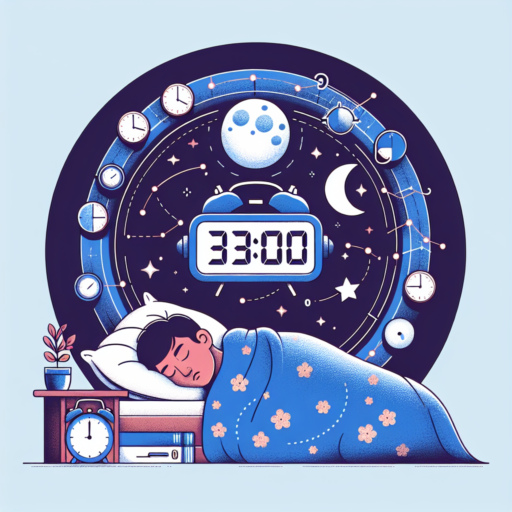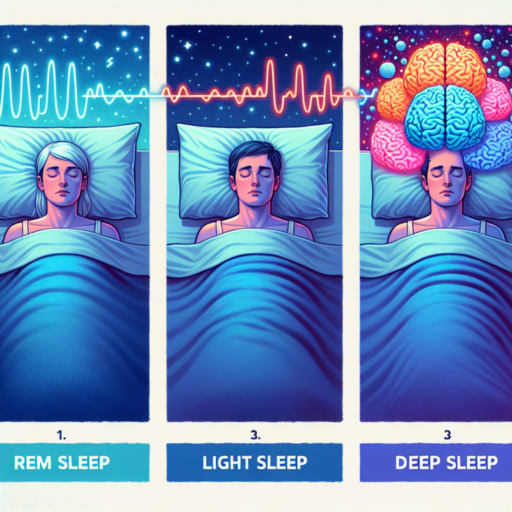Understanding Sleep Stages and Their Importance for Health
Sleep is a fundamental component of our overall health and well-being, playing a critical role in physical health, mental health, and quality of life. Understanding the stages of sleep and their significance can lead to improved sleep habits and, consequently, better health outcomes. Sleep can be divided into several stages, each characterized by different brain wave activities and physiological responses.
The sleep cycle consists of four main stages, starting with three stages of non-rapid eye movement (NREM) sleep, followed by one stage of rapid eye movement (REM) sleep. The first stage of NREM, known as N1, is the transition from wakefulness to sleep and is characterized by light sleep from which it is easy to be awakened. Following N1, the N2 stage occurs, involving slightly deeper sleep and marked by specific patterns in brain wave activity, such as sleep spindles and K-complexes. The third stage, N3, is often referred to as deep sleep or slow-wave sleep, essential for physical recovery and growth hormone release. Finally, REM sleep is associated with dreaming and plays a critical role in cognitive functions such as memory consolidation and emotional regulation.
The Role of Each Sleep Stage
- N1 Stage: Acts as a bridge between wakefulness and sleep, allowing the body to ease into a state of rest.
- N2 Stage: Helps in memory consolidation and information processing, preparing the brain for deep sleep.
- N3 Stage: Facilitates physical recovery, immune system strengthening, and growth hormone release, crucial for bodily repairs.
- REM Sleep: Supports brain development, enhances learning, and stabilizes emotions, playing a key role in mental health.
Each stage of sleep serves a unique purpose, contributing to the restoration and rejuvenation of the body and mind. The cyclical nature of these stages throughout the night ensures that the body receives the full spectrum of benefits from sleep, highlighting the importance of not just the quantity but also the quality and pattern of sleep. By understanding the stages of sleep and their respective roles in our health, individuals can appreciate the profound impact that good sleep hygiene has on our daily lives and long-term well-being.
The 4 Essential Sleep Stages and What Happens During Each
Understanding the 4 essential sleep stages is vital to appreciating the complexity of sleep and its impacts on our health and well-being. Each stage of sleep plays a unique role in restoring and rejuvenating the body and mind, making the cycle of sleep stages repeated throughout the night essential for optimal functioning during waking hours.
Stage 1: NREM Light Sleep
The initial stage of sleep is characterized by light sleep, where you transition from wakefulness to sleep. This stage typically lasts for 5 to 10 minutes and involves a decrease in heart rate, breathing, and eye movements. During Stage 1, the body begins to relax, but it’s easy for disturbances to awaken a sleeper, making this the most fragile of the sleep stages.
Stage 2: NREM Deep Sleep
Following Stage 1, the body enters a more profound state of sleep known as Stage 2. This stage is crucial for physical recovery, immune system strengthening, and energy restoration. It’s characterized by a further reduction in heart rate and body temperature. Sleepers spend approximately half of their sleep time in Stage 2, which serves as a bridge to the more restorative stages of sleep.
Stage 3 & 4: REM Sleep
The final stages of the sleep cycle are known collectively as REM (Rapid Eye Movement) sleep. This period is marked by increased brain activity, vivid dreams, and temporary paralysis of the muscles to prevent acting out dreams. REM sleep is critical for emotional regulation, memory consolidation, and creativity. As the night progresses, the duration of REM stages increases, culminating in the most extended REM period occurring just before waking up.
How Much Sleep Do You Really Need? Examining Ideal Sleep Times
Understanding the right amount of sleep can be a game-changer for your overall health and well-being. The common adage of needing 8 hours a night is a good baseline, but the truth is, individual sleep requirements can vary significantly. Age, lifestyle, and even genetics play a crucial role in determining how much sleep you really need.
Different life stages require different amounts of sleep. For instance, the National Sleep Foundation guidelines suggest that adults aged 18-64 need between 7-9 hours of sleep per night, while older adults, aged 65 and above, may require 7-8 hours. But it’s not just about the numbers; the quality of sleep is equally important. Factors that influence sleep quality include sticking to a consistent sleep schedule, ensuring a quiet and dark environment, and avoiding caffeine and electronics before bedtime.
Adjustments to sleep patterns can also be vital. Paying attention to your body’s signals and how you feel during the day can help you identify your optimal sleep duration. Feeling alert and well-rested throughout the day is a good indicator that you’re getting enough sleep. However, feeling sluggish or needing excessive amounts of caffeine to get through the day might suggest you need to adjust your sleep schedule for better health and productivity.
Diving Into REM Sleep: Understanding Its Role and Timing
REM sleep, standing for Rapid Eye Movement sleep, plays a crucial role in our sleep cycles. Unlike other sleep stages, REM sleep is characterized by increased brain activity, rapid eye movements, and vivid dreaming. It’s a phase where the brain processes emotions, consolidates memories, and supports overall cognitive health. Understanding the timing and significance of REM sleep can enlighten us on its vital functions and how it impacts our daily wellbeing.
When Does REM Sleep Occur?
REM sleep typically begins about 90 minutes after falling asleep. As the night progresses, these REM periods become longer, especially during the second half of the night. This explains why if you wake up or are disturbed in the early hours, you might miss out on the majority of your REM sleep, leading to feelings of grogginess or cognitive sluggishness during the day.
Why Is REM Sleep Important?
The importance of REM sleep cannot be overstated. During this stage, the brain is almost as active as it is when you are awake, engaging in processes crucial for learning and memory. It’s a time when the brain «prunes» unnecessary information and strengthens connections between neurons, enhancing problem-solving abilities and creativity. Furthermore, REM sleep has been linked to emotional well-being, with disrupted REM sleep patterns often observed in those with depression or anxiety disorders. Paying close attention to the timing and quality of your REM sleep can be a significant step toward improving mental health and resilience.
The Impact of Deep Sleep on Your Body and Mind.
Experiencing deep sleep is pivotal for both physical and mental health, acting as a cornerstone for overall well-being. During this critical phase of sleep, our bodies undergo significant recovery and rejuvenation processes that are vital for health and function. Understanding the profound influences of deep sleep can illuminate the importance of prioritizing sleep quality in our daily lives.
On a physical level, deep sleep plays a crucial role in healing and repair. During this state, growth hormones are released, fostering cell regeneration, muscle growth, and tissue repair. This phase is essential for the body to recover from the wear and tear of daily activities, reduce inflammation, and boost immune function. Moreover, studies have highlighted the importance of deep sleep in regulating metabolism and maintaining healthy weight, underlining its role in physical health.
Mentally, deep sleep is equally beneficial, acting as a reset button for the brain. It is during this stage that the brain processes and consolidates memories, transforming short-term recollections into long-term storage. This aspect is crucial for learning and cognitive function. Furthermore, deep sleep has been shown to play a role in emotional regulation and mental health, helping to manage stress, anxiety, and mood. The mind’s ability to clear out neurotoxic waste during deep sleep is also thought to be critical in preventing neurodegenerative diseases.
No se han encontrado productos.
Navigating Through Light Sleep: Its Role and Significance
Understanding the role and significance of light sleep is essential for navigating through the complexities of our sleep cycles. Light sleep, often referred to as the first and second stages of the non-REM (NREM) sleep cycle, plays a critical role in our overall health and well-being. During these stages, the body begins to disengage from its surroundings, leading to a decrease in heart rate, breathing rate, and muscle activity. This phase acts as a bridge to deeper stages of sleep and is pivotal for cognitive functions such as learning and memory consolidation.
One of the key benefits of light sleep is its impact on brain health. Light sleep facilitates the processing and consolidation of new information, making it an invaluable part of the learning process. It’s during this time that the brain sorts and stores daily experiences, converting them into long-term memories. Additionally, light sleep contributes to the restoration of mental and physical energy, preparing the body for the day ahead. Without sufficient light sleep, individuals may experience decreased cognitive function, mood swings, and a higher susceptibility to stress.
Moreover, light sleep serves as a critical period for physical restoration and repair. While it may seem less important than deeper stages of sleep, such as REM, it nonetheless plays a role in cellular restoration and supports immune system functioning. Understanding the significance of light sleep can lead to improved sleep hygiene practices, such as establishing a regular sleep schedule and creating a conducive sleeping environment, which can ultimately enhance the quality of both light and deep sleep phases.
Strategies to Optimize Your Sleep Stages for Better Rest
Understanding and optimizing the various stages of sleep can significantly improve the quality of your rest. Sleep is not just a passive activity but a complex, active process that rejuvenates and restores our body and mind. To harness the full potential of your sleep, employing specific strategies that cater to enhancing each sleep stage is essential.
Adapt Your Environment for Optimal Sleep
Creating a sleep-conducive environment is pivotal in optimizing sleep stages. This includes ensuring your bedroom is dark, quiet, and cool. The absence of light sends a critical signal to your body that it’s time to rest, aiding in faster transitions into deeper sleep stages. Implementing white noise machines or earplugs can also mitigate the impact of ambient sounds, while maintaining an optimal temperature between 60-67 degrees Fahrenheit can further enhance sleep quality.
Establish a Consistent Sleep Schedule
Regularity is key when it comes to sleep. Aligning your sleep schedule with your body’s natural circadian rhythm helps in a smoother transition through the sleep stages. Attempt to go to bed and wake up at the same time every day, even on weekends. This consistency reinforces your body’s sleep-wake cycle, making it easier to fall asleep and wake up naturally, ensuring you spend an adequate amount of time in each critical sleep stage.
Be Mindful of Your Diet and Exercise
Diet and exercise play a significant role in how well you sleep and move through the sleep stages. Consuming caffeine or heavy meals close to bedtime can disrupt your ability to fall asleep and may impact the quality of your REM sleep. Conversely, regular physical activity can enhance the amount of deep sleep you get, aiding in the physical repair and regeneration processes. However, exercise should be avoided close to bedtime as it can increase alertness and make it harder to fall asleep.
Common Sleep Disorders and Their Effect on Sleep Stages and Times
Sleep is an essential aspect of human health, serving as a fundamental pillar for physical and mental well-being. However, various sleep disorders can significantly impact the quality, stages, and timing of sleep, leading to a decrease in life quality and an increase in health-related risks. Understanding these disorders is crucial in managing and minimizing their effects on sleep.
Insomnia
As one of the most common sleep disorders, Insomnia directly impacts the ability to fall asleep or stay asleep. Individuals suffering from insomnia experience significant reductions in both sleep duration and sleep quality. This disorder often leads to prolonged periods of wakefulness at night, ultimately disrupting the sleep cycle and impairing the transition between sleep stages.
Sleep Apnea
Sleep Apnea is a serious disorder characterized by repeated pauses in breathing or shallow breaths while you sleep. These interruptions can dramatically alter the natural progression of sleep stages, especially the deep and restorative stages of sleep. Consequently, individuals with sleep apnea often experience daytime sleepiness and fatigue, consequences of fragmented sleep patterns and inadequate rest.
Restless Legs Syndrome (RLS)
Another prevalent condition affecting sleep is Restless Legs Syndrome (RLS), a neurological disorder that induces an irresistible urge to move the legs. This urge frequently occurs in the evenings and can severely affect the onset of sleep, delaying the transition from wakefulness to the sleep stages. RLS sufferers often find it challenging to achieve prolonged periods of deep sleep, resulting in significant sleep deprivation.
Tracking and Improving Your Sleep Stages with Technology
In the era of digital health, understanding and improving our sleep patterns has become significantly easier thanks to advanced technology. Tracking sleep stages—ranging from light and deep to REM (Rapid Eye Movement) sleep—is crucial for enhancing overall sleep quality. With the help of wearable devices and smartphone apps, individuals can gain insights into their sleep architecture and make informed decisions to improve it.
These technological tools work by monitoring your physiological signals, such as heart rate variability, movements, and breathing patterns throughout the night. This data is then analyzed to provide a detailed breakdown of your sleep stages. For instance, wearables like smartwatches and fitness bands use accelerometers and heart rate monitors to detect when you’re awake, in light or deep sleep, and when you enter the REM stage, which is essential for cognitive functions and memory consolidation.
Moreover, many of these devices come equipped with features to enhance sleep quality actively. They may include smart alarms that wake you up at the optimal sleep stage, reducing grogginess and making it easier to start your day. Additionally, some apps offer personalized recommendations based on your sleep data, such as adjusting your sleep environment, bedtime routines, and even dietary suggestions. By leveraging this technology, individuals can take proactive steps to not only track but also significantly improve their sleep health.
Sleep Tracking Apps and Their Functions
- Insight Generation: Provides detailed analytics on sleep duration and quality.
- Environment Optimization: Offers tips on improving the sleep atmosphere, like temperature and noise control.
How to Adjust Sleep Times for Maximum Energy and Productivity
Certainly! Adjusting your sleep times can significantly enhance your energy levels and productivity throughout the day. The key is to align your sleep schedule with your body’s natural rhythm and the demands of your day-to-day life.
Understanding Your Circadian Rhythm
The first step in optimizing your sleep for energy and productivity is to understand your body’s circadian rhythm. This internal clock regulates your sleep-wake cycle, signaling your body when it’s time to sleep and wake up. Paying attention to your body’s natural indicators of sleepiness and alertness can guide you in setting a sleep schedule that harnesses your peak productivity periods.
Creating a Consistent Sleep Schedule
Consistency is vital when it comes to adjusting your sleep times. Going to bed and waking up at the same time every day, even on weekends, can profoundly impact your energy levels. This regularity strengthens your body’s sleep-wake cycle, making it easier to fall asleep and wake up naturally. The benefits extend beyond just feeling rested; a consistent sleep schedule can also sharpen your focus and enhance cognitive function, critical components of productivity.
Incorporating Strategic Napping into Your Routine
Short naps (20-30 minutes) can be a powerful tool for boosting energy and productivity, particularly if you’re not getting adequate sleep at night. Strategic napping can help refresh your mind, improving cognitive functions and mood without the grogginess associated with longer naps. However, timing is crucial; napping too late in the day can interfere with nighttime sleep, so aim for the early afternoon to align with a natural dip in your circadian rhythm.




